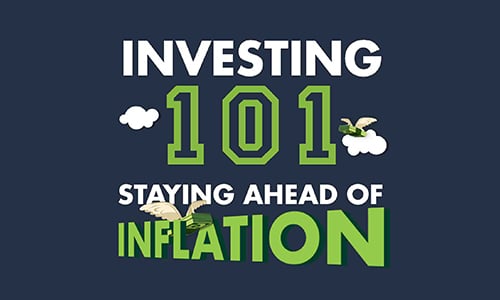
For many of us, inflation hasn’t been a major factor impacting our lifestyle and retirement needs. It’s been decades since the overall inflation rate was a major consideration. But with an inflation rate of approximately 7.5% over the past twelve months, it’s time to think about what this means for each of us as we plan for earning, saving, and investing to fund for our futures.
Inflation Defined and How it’s Caused
Simply put, inflation measures how much more expensive a set of goods and services has become over a certain period, typically 12 months. It can measure all goods and services in an economy, or be specific to a certain set of goods and services, such as gasoline or produce.
Many factors can cause inflation. Long-term inflation can often be caused by poor monetary policy that leads to the money supply being too large for the size of the economy. Inflation can also be caused by the expectations of large businesses. If businesses anticipate prices to go up, they will take actions that will increase costs to their own customers.
The Impact of Inflation (both bad and good)
With inflation, the average household’s income does not increase as much as prices, so they are worse off because they aren’t able to afford as much.
But the reality is, prices often change in phases. These unevenly rising prices reduce the purchasing power of many consumers, but not always equally. For instance, consider recipients and payers of fixed interest rates. If a retiree receives a fixed 5% yearly increase to their pension, an inflation rate higher than 5% decreases their purchasing power.
Finally, many economists say they believe the most recent, historical inflation rates of the last couple of decades – low and relatively stable – are good for the economy. When businesses and consumers can count on prices being slightly higher in the future, there is incentive to make purchases sooner, which can boost economic activity.
What We Can Do to Stay Ahead of Inflation
So what does all of this mean to each of us, considering many of us haven’t dealt with high inflation in our adult lives? Beyond the adjustments to shopping habits and the pressure to increase compensation, here are a few considerations when it comes to saving and investing:
- Consider the amount of money in your savings account. Inflation will typically outpace the interest rates in any savings account, thus nibbling away at the account value and eroding your purchasing power.
- Don’t avoid equities (even if you’re risk averse). Because leaving too much money parked in a savings account will lead to an erosion of it’s value during a period of high inflation, a diversified portfolio that includes stocks can help you stay ahead of rising consumer prices.
Making the Appropriate Adjustments for High Inflation
As we all deal with an economic phenomenon not experienced in several years, there are some simple pivots that can make a real difference in our financial health.
Changing your shopping habits to reduce your expenses – making due with less, buying in advance of rising prices, and switching to generic brands – can help.
But the most important thing you can do is to diversify your portfolio to keep up or even outpace the inflation rate. Make sure to seek counsel from your financial advisor for specific strategies to optimize your financial health, especially during volatile times.